- Home
- Clive Barker
Sherlock Holmes and the Servants of Hell Page 6
Sherlock Holmes and the Servants of Hell Read online
Page 6
I said nothing to Holmes about all this, but it was clear to me that his malaise was gaining momentum. That if these were in fact efforts to feel something, to feel alive, then they might well kill the man instead.
It wasn’t long after this that Holmes received a summons from his brother Mycroft, to come to the Diogenes Club – he wished to speak to him about a most urgent and delicate matter. Such a ‘request’ was not a common thing, and it had only been a few months since we had last aided Mycroft, so this came as something of a surprise. It was during that former affair Holmes finally felt able to confide in me about what his older brother really did; about his crucial role in the British Government (about how, at times, he was the British Government). Imagine my amazement to discover that the conclusions of every single department were passed on to him, that Mycroft was the central exchange, the clearing house which makes out the balance. Before that, when investigating the curious case of Mr Melas, Holmes had told me only that his sibling audited books for some government departments; and before that, I had no idea at all that Holmes even had a brother, for he had never mentioned him – nor any other member of his family, come to that.
If Mycroft was calling for us again so soon, it could only mean trouble – and within an hour of the telegram arriving we were at the door of the Diogenes, a club on Pall Mall that Mycroft actually co-founded and appropriately named after the Greek philosopher who was one of the founders of Cynicism: the moral being to trust nothing and nobody. It was an odd place, the Diogenes, where you had to be as quiet as a mouse unless you were in the ‘Stranger’s Room,’ which was where we were taken upon our arrival: past lots of ancient-looking gentlemen all sitting in leather chairs, smoking cigars and reading their periodicals – and up the winding staircase.
I had visited the Stranger’s Room before, but it never failed to impress me. More books lived here than in most libraries, and this time they were not ledgers like those that lined the walls of Mr Cotton, Sr’s study. Instead they were more interesting volumes on history, on science, on... indeed, on every subject you cared to name; in addition to the fiction volumes that I would love to have spent a year sitting and reading in the comfort of this place.
Mycroft was seated by the window, looking out. Holmes had said once that the man lacked energy (the two brothers were exact opposites, much like the Cottons), and this is how I will always remember him until the day I die: in a seated position, watching the world go by outside – and content in the knowledge that he had a major say in how it was run. A large gentleman with a rapidly receding hairline, Mycroft said nothing in greeting: he merely waited for Holmes to join him at the window.
Then, and only then, did Mycroft raise a chubby finger and point down into the street. “Those two, Sherlock.”
Holmes raised a hand to his chin and I drew closer, in an effort to also see the pair Mycroft had singled out. A man of about thirty, with what I assumed to be his partner – a slightly older woman – linked arm in arm.
“I’m sure to the casual bystander they might appear to be a couple, but there is more to it than that. Observe the way she is pulling him in, directing him. And look now, how they stop at the edge of the road – a ritual since the man was a boy. She is quite clearly his mother, though she had him early in life. She was widowed early, too, and transferred her affections – and obsessions – to her son, quite possibly in a most unhealthy way, that will have seen a number of suitors run a mile in the opposite direction.”
As I watched, the more I could see the controlling nature of the woman, the way she was looking left and right before almost dragging the poor man across the road. Then, at the other side, adjusting his coat lapels, brushing him down and bidding him stand up straight. A domineering mother, who had never wanted her ‘boy’ to grow up.
“They are returning home having just visited the travelling fair which has set up camp in Hyde Park,” said Mycroft. “Note the traces of pink on the edges of his sleeves, where she bought him a strawberry penny-lick ice cream – an enforcement of the mother-son relationship she has encouraged over the years. He attempted to win a stuffed animal for her at the coconut shy, but was unsuccessful, hence their sour faces after coming away from such a place of merriment; not to mention the rough handling and lack of patience of a parent disappointed in her child.”
I’d witnessed this game a few times now, something – I deduced myself – that started when these two were little, but was still astounded by it. Holmes had told me before that Mycroft’s analytical skills even outstripped his own, but would never put it to the same use because of his lack of energy and ambition (though I had to wonder, how much more ambitious could a man be whose word was taken as Gospel at even the highest of levels?). Nevertheless, you could see the rivalry between them in these mental jousts. Though it was hard to picture either of them as boys, I had an image in my mind of them doing this at home or at school.
Holmes also said that Mycroft lacked the imagination to make leaps of deduction that he was able to. I wondered now what the fellow might have made of our last two unsolved cases: the missing men, the bearded vagabond and the smell of vanilla. Would he dismiss them as nonsensical, as I was inclined to do myself? But we were not here to pick his brains about such things.
Mycroft turned to look at me then, obviously satisfied by a palpable hit – I wasn’t sure how these things were scored – and said, “Dr Watson, how pleasant to see you. I do hope you’ve gotten over your little bout of jealousy. The grudge you’ve been holding against me since I helped facilitate Sherlock’s ruse?”
Nothing had ever been said openly about this, and I omitted the atmosphere between us when writing up our last meeting, but I should have known that something as obvious as my feelings about the deception would have been picked up on by a brain such as Mycroft’s.
“I do not blame you for that, I assure you.”
Mycroft gazed at me and smiled. “Nor should you blame Sherlock. He was just trying to do what was best for all concerned, to keep you out of harm’s way, Doctor. We do not have the luxury of choosing our family, but we do choose our friends. If anything, that should tell you more about how much Sherlock –”
“Mycroft!” snapped Holmes.
Until that moment, I hadn’t thought about the situation that way. Over the previous years, I’d spent so much time with Holmes – come to know him better than anyone else, even his own brother. Come to think of him almost as a brother. And I felt sorry for Mycroft, for although Holmes had confided in him when he needed to lay low, there would never be the same bond that my friend and I shared. Whether that was intentional or not, I cannot say. Holmes wasn’t to know what the effects of his actions would be, the consequences inflicted upon myself and –
But it also made me sad that Holmes had changed so much in the time since his return; that he was shutting me out now as well. That he had his own private little world I was no part of, his own demons to battle.
“And you, Sherlock,” said Mycroft, turning to face his younger sibling. “You are looking thin and drawn. Is there something I should be concerned about?”
“Nothing that warrants serious consideration,” replied Holmes rather too quickly. “You, brother of mine, on the other hand, appear quite the opposite – you’ve put on several pounds since I last saw you. A consequence, no doubt, of too many potted shrimp consumed here at the Diogenes. When you are worried, you eat more – I take it our summons here today and your expanding waistline are related?”
Mycroft remained silent for a moment or two before nodding. “As grave as the situation was when I called upon you over the missing plans last November, circumstances have arisen that might even put that debacle in the shade.”
“Good Lord – what could possibly be worse than the start of a war?” I asked.
“The complete disintegration of the infrastructure of the British Government,” Mycroft announced without missing a beat.
While I took that statement in, Holmes said, “Explain
.”
Mycroft laced his hands together over his considerable girth. “Have you heard of a fellow by the name of James Philip Monroe?”
“I have,” I stated. “Owner of a gentleman’s club called the Vulcania, I believe.”
“After the Roman God of Fire and Forge,” added Holmes.
“Not the sort of place you’d expect to see members of the Diogenes,” I remarked.
“You would be surprised,” replied Mycroft. “And one of the youngest owners of such a club in England’s history. I knew his parents much better, before they passed away. His father came into money abroad and made a bit of a name for himself, although, it is said, not altogether legally. It is also rumoured that Mr Monroe, Jr did not want to wait for nature to take its course as regards to his inheritance.” He let that settle before continuing. “The Vulcania – above which Mr Monroe has lodgings – caters to all kinds of needs, from gambling to more... uncouth practices. Certainly some pleasures of the flesh, so I hear. But discreetly.”
“Hardly that, Mycroft. Parties at the Vulcania are legendary,” I assured him. “They almost rival those of the Hellfire Club!”
“Legends are myths, Doctor. And myths are very hard to prove – especially when you have certain members of the police force on your payroll. One Inspector Thorndyke, for example; who, it is said, clears up a lot of the messes that inevitably ensue after said parties.
“Mr Monroe has the ear of some very important people, something that has consequently led to my keeping an eye on the lad for some time. He is a collector, you see.”
“Of antiquities?” I asked, settling myself down into one of the other leather chairs in the Stranger’s Room.
“Of a sort, ones that come with quite an expensive price tag. But he is also a collector of people, and of secrets. It is how he is able to further fund his expensive lifestyle. His secrets, gained when guests are at their most vulnerable, ensure that he has their full co-operation – and access to their wealth.”
We had come across another scoundrel like this already only four years previously: Charles Augustus Milverton, who demanded as much as seven thousand pounds for letters the owners of which would not want exposed. He came to a very sticky end when one of his former victims shot him; hoist by his own petard.
Holmes could see what I was thinking, the obvious comparison, and said, “These... guests knew full well what they were entering into. They weren’t the dalliances of youth come back to haunt them. Moreover, I suspect they even paid a hefty sum to place themselves in such positions.”
“True,” said Mycroft. “Quite true.”
“So, I fail to see that it is any concern of ours!” Holmes concluded.
“It is now that James Philip Monroe has gone missing,” Mycroft countered, then pursed his lips.
“Missing?” repeated Holmes. He looked back at me, then found a seat himself. “Missing, you say?”
“I do indeed. No-one has seen him in close to three days.”
Perhaps someone had done the same to him that the woman with the famous husband did to Milverton, I thought to myself. And good riddance, too!
“The man rarely leaves his chambers, nor sets foot outside of his club,” Mycroft continued. “Yet there doesn’t appear to be a sign of him anywhere. The last anyone saw of him, he was heading back to his bedroom late at night with a lady, which is not at all unusual for him; and they are nearly always ladies from an unsavoury background, with no family or friends to speak of. But nobody saw her leave, and neither of them were present when his servants brought breakfast the next morning.”
“I presume this is not something that was reported to the authorities,” Holmes said.
“Hardly – although I think you’ll find Inspector Thorndyke has looked into it, privately, probably more to make sure his own nose is clean than anything else. You see, Monroe disappeared without letting anyone know where he keeps his stockpile of secrets. He definitely would not have entrusted them to a bank – you, of all people, should recognise how unreliable they are, Sherlock. Look what almost happened regarding that business with the Red-Headed League!
“Monroe never struck me as the trusting sort anyway,” Mycroft went on. “Which leads me to conclude that what we’re looking for is still somewhere in his chambers. And if ever they were to get into the wrong hands, Sherlock...” Mycroft visibly shuddered.
“So you want us to find his hiding place, rather than the man himself – and the unfortunate woman he was with?” I asked.
“If one is a consequence of the other, then all the better. I’m sure it is not something that Thorndyke will be looking into all that closely. Ah, but from what I hear you’ve become a bit of a missing persons’ agency of late, isn’t that correct?”
Holmes said nothing in reply.
“You know exactly what’s at stake here, Sherlock,” said Mycroft, using a kind of blackmail of his own. “Besides, I thought it would be a... diversion you’d find interesting.”
“Wait a moment, just how exactly are we expected to search his chambers?” I asked. “Climb inside like common burglars?”
“Not at all. The club and its activities have continued unabated, hosted by Monroe’s right-hand man – a former barman by the name of Richard. They are trying to maintain the illusion that Monroe is in charge; he has been absent for days at a time before, recovering from particularly lengthy entertainments. There is a private party tonight, in fact, and you two gentlemen are on the guest list – under assumed names, naturally. Your credentials have been vouched for, all you need to do is show up.”
I swallowed dryly, not relishing the prospect at all. “What if we are recognised?”
“Recognised?” Mycroft began to laugh out loud. “Recognised?” His chuckles were so loud I feared he might disturb the rest of the members of the Diogenes below us. “Oh, Doctor, I never realised what a wit you have.”
“I’m quite serious,” I said sternly. After all, I had a reputation to maintain, not only as an agent of the law, but also a practising physician. I didn’t care who might be venturing to the Vulcania, nor for what reason; I did not want to be seen to be there myself.
“My good fellow, I do believe you are. Why, are you not lodging with one of the great masters of disguise of our generation? If my brother can conceal his true identity well enough to fool the Napoleon of Crime and his cohorts, then I’m sure you pose no challenge whatsoever to him.”
And so, the meeting was over. It only remained for us to return to Baker Street and prepare for the evening’s adventures. But no matter what form they took, they would not prove to be any preparation for what lay ahead.
No preparation at all.
CHAPTER SIX
Pleasure and Pain
MY INAUGURAL EXPERIENCES at the Vulcania Club were bad enough at the time, however.
I saw things there that I would not wish to repeat in good company, although as no-one will ever see this journal I will share them here. If nothing else it will serve as some form of catharsis, like the rest of this account.
By the time Holmes was finished with us both, and I looked in the mirror, I no longer recognised myself, let alone him. Mycroft had been right, of course, and we could have strolled past a parade of people we had helped incarcerate over the years and not a one would have been able to pick us out. Holmes’ skills in this department – as with many of his talents – were exemplary.
My friend had donned a false nose and padded out his mouth with wadding. A bit of rouge on his cheeks, a monocle, a wildly different hairstyle and the result was incredible. Turning his attentions to me, he extended my moustache to a trimmed fake beard and added bushy eyebrows with actor’s glue. A false set of yellowing, crooked teeth were the only things necessary to complete the illusion. It even changed the way I spoke!
“There,” he said, once we were done. “Not even Mrs Hudson will recognise us!” As if on cue, the woman knocked and entered the study without waiting for a ‘come.’ She set down the pot of tea she
’d made for us and said hello to both myself and Holmes in turn.
“I’ll leave you boys to it,” she said as she retreated.
Now, for one thing she knew we were both in residence upstairs – she had taken our coats and hats after visiting Mycroft – and for another she was well used to seeing Holmes dressed up in a variety of disguises after all this time; but all the same...
“Well, perhaps not Mrs Hudson,” Holmes admitted, and I thought he was going to laugh then, but he caught himself and turned more serious again – as he was wont to do these days. “I think perhaps we should be on our way, don’t you?”
“Holmes, I –”
But he was already heading for the door, leaving me behind.
As I followed and went down the stairs, feeling sorry for Mrs Hudson as she looked from us to the study above where her tea had been left, ignored, I wanted to say more to my friend – but, as always, the timing just wasn’t right.
What Mycroft had hinted at back at the Diogenes was still on my mind. What he’d said about friends and family. The more I thought about it, the more I wanted to do something to help Holmes – to steer him away somehow from this dangerous road he was heading down: this terrible testing of himself. I simply could not fathom the reasoning behind it all.

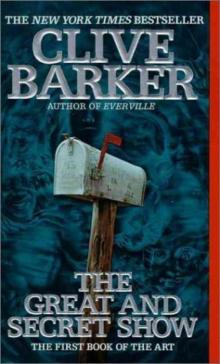 The Great and Secret Show
The Great and Secret Show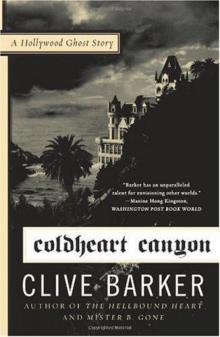 Coldheart Canyon: A Hollywood Ghost Story
Coldheart Canyon: A Hollywood Ghost Story Galilee
Galilee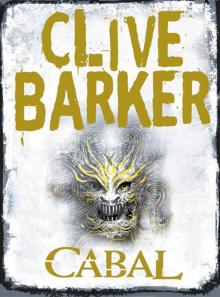 Cabal
Cabal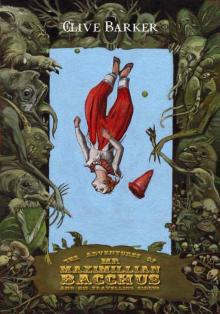 The Adventures of Mr. Maximillian Bacchus and His Travelling Circus
The Adventures of Mr. Maximillian Bacchus and His Travelling Circus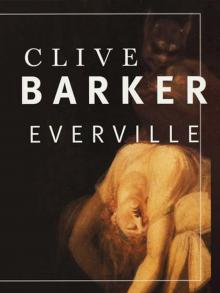 Everville
Everville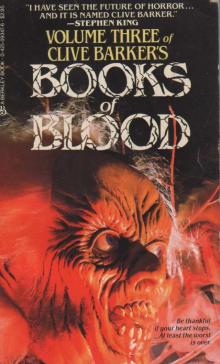 Books of Blood: Volume Three
Books of Blood: Volume Three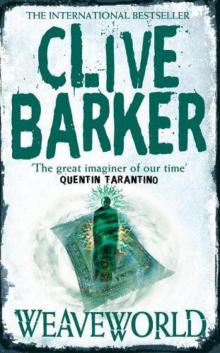 Weaveworld
Weaveworld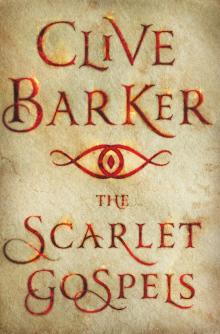 The Scarlet Gospels
The Scarlet Gospels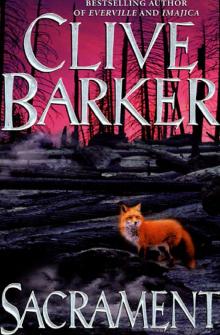 Sacrament
Sacrament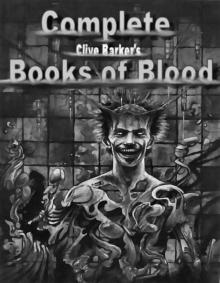 Books of Blood: Volumes 1-6
Books of Blood: Volumes 1-6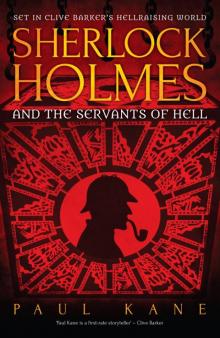 Sherlock Holmes and the Servants of Hell
Sherlock Holmes and the Servants of Hell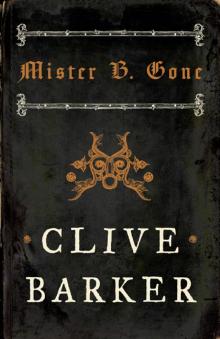 Mister B. Gone
Mister B. Gone Imajica
Imajica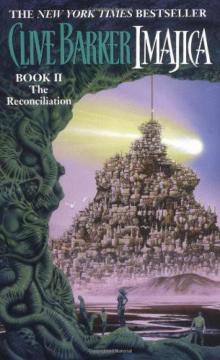 The Reconciliation
The Reconciliation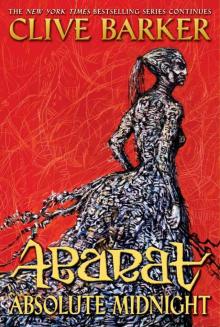 Abarat
Abarat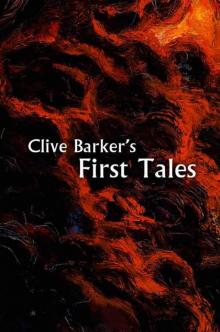 Clive Barker's First Tales
Clive Barker's First Tales The Hellbound Heart
The Hellbound Heart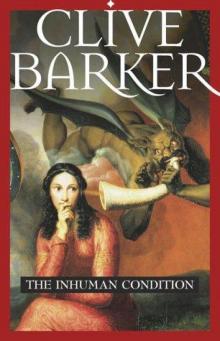 The Inhuman Condition
The Inhuman Condition Infernal Parade
Infernal Parade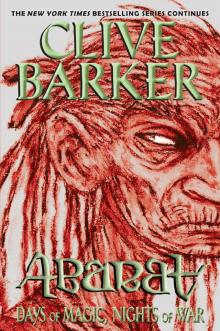 Days of Magic, Nights of War
Days of Magic, Nights of War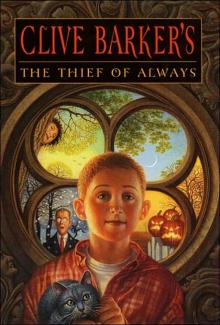 The Thief of Always
The Thief of Always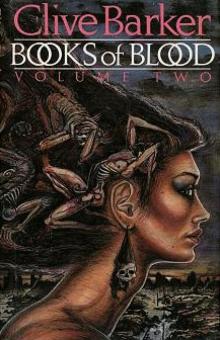 Books of Blood Vol 2
Books of Blood Vol 2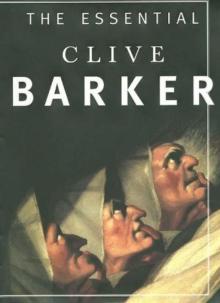 The Essential Clive Barker
The Essential Clive Barker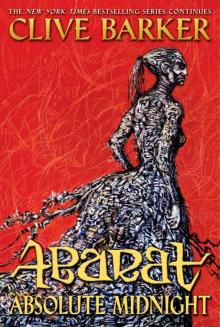 Abarat: Absolute Midnight a-3
Abarat: Absolute Midnight a-3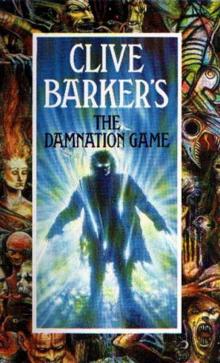 The Damnation Game
The Damnation Game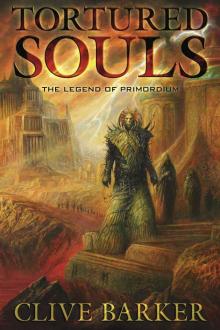 Tortured Souls: The Legend of Primordium
Tortured Souls: The Legend of Primordium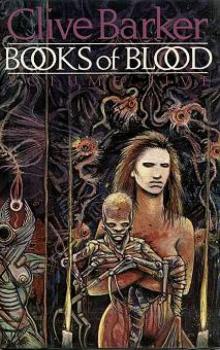 Books of Blood Vol 5
Books of Blood Vol 5 Imajica 02 - The Reconciliator
Imajica 02 - The Reconciliator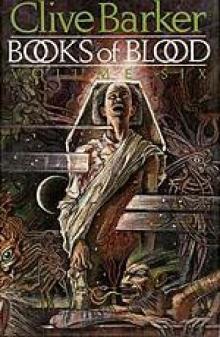 Books Of Blood Vol 6
Books Of Blood Vol 6 Imajica 01 - The Fifth Dominion
Imajica 01 - The Fifth Dominion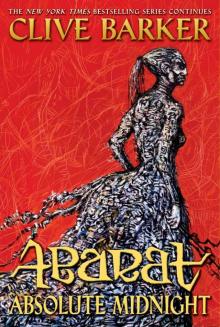 Abarat: Absolute Midnight
Abarat: Absolute Midnight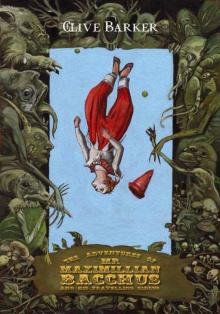 The Adventures of Mr. Maximillian Bacchus & His Traveling Circus
The Adventures of Mr. Maximillian Bacchus & His Traveling Circus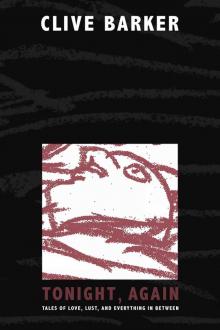 Tonight, Again
Tonight, Again Abarat: The First Book of Hours a-1
Abarat: The First Book of Hours a-1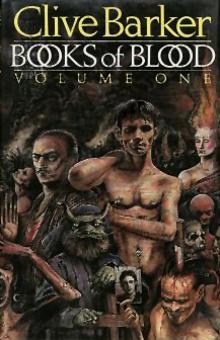 Books Of Blood Vol 1
Books Of Blood Vol 1 Age of Desire
Age of Desire Imajica: Annotated Edition
Imajica: Annotated Edition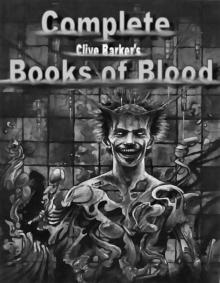 Complete Books of Blood
Complete Books of Blood Gutted: Beautiful Horror Stories
Gutted: Beautiful Horror Stories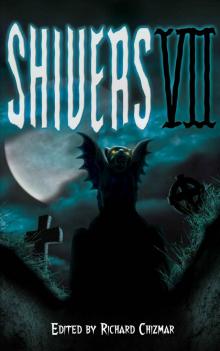 Shivers 7
Shivers 7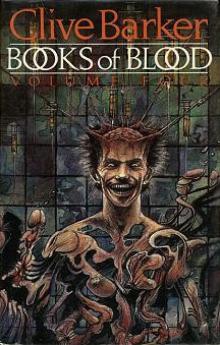 Books Of Blood Vol 4
Books Of Blood Vol 4